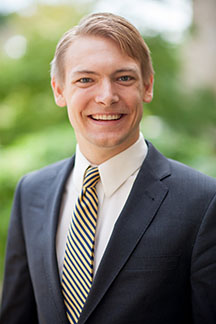 Chris Stepien
Chris Stepien
Chris Stepien came to ESTEEM with a bachelor’s degree in chemical and biomolecular engineering from Notre Dame, a new-found interest in consulting, and no preparation for the big-league hiring process in that field. The program equipped him with resume-writing, networking, and interviewing skills, along with a supportive cohort of classmates, that have already paid off: Stepien is the first ESTEEM student who has landed a job with the world-class Boston Consulting Group (BCG), a management consulting firm that advises more than two-third of the Fortune 500 and ranks near the top of Fortune’s 100 Best Companies to Work For.
“Coming into ESTEEM, my main focus was to get a consulting job,” Stepien says. “It felt like something where I could continue to explore and learn a lot. With the business background ESTEEM gave me, I wanted to continue into the future with consulting. You get to see a lot of different projects, move around to a lot of different businesses, and meet a lot of different people.”
Along with rigorous coursework, teambuilding for the McCloskey Business Competition, and a long-term capstone thesis that builds self-management – Stepien is helping Hiller Carbon of Tampa diversify into the graphite market – ESTEEM is packed with opportunities to hone the self-presentation skills that ensure top-level placement for graduates.
“They know they have great resumes because that’s how they got to ESTEEM,” Stepien says. “They teach you once you get in the door how to use that to your advantage. I think one of the best things ESTEEM did for me was the Business Model Canvas,” an early assignment to interview 15 to 25 potential customers about a business idea. “That was incredibly helpful because it gave you a lot more confidence in talking to people you didn’t know. ESTEEM does an incredible job of setting up events where you get to network with people. I also enjoy going and talking to new people about their stories and who they are.”
A remark by a visiting speaker provided a liberating new perspective to the engineering major with no networking background.
“He said, ‘Networking isn’t necessarily looking for a job. When you’re networking you’re meeting people and getting to know their stories,’” Stepien recalls. “That takes a lot of stress out of the networking process. It can be hard to go in and ask somebody for a favor like ‘will you give me a job?’ vs. learn to know them as a person. I think that’s an important part. You can have the classes, the leadership, and the resume, but if you get in the interview and fall flat, you’re not going to have a chance to be successful there.”
ESTEEM makes sure students won’t fall flat on interviews.
“Coming into ESTEEM, we had a lot of help in terms of learning how to interview with people, how to make your resume look nice,” Stepien says. “We practiced case interviews with classmates. I think one of the best things that happened with me was I was able to create such a great application thanks to the help ESTEEM gave me that when I started applying to these jobs, I got a lot of interviews. The first couple of interviews, even if you practice going up to it, could be hard to hit out of the park on the first try.”
Stepien applied to 11 companies and got interviews at eight – about a dozen interviews counting follow-ups. The process was second nature by the time he went to his BCG interview.
“That was a huge advantage,” he says. “I felt very comfortable going into my BCG interview.
“I felt comfortable hanging around those people and being with them. When I got to the final round, I felt really confident that this was where I wanted to be. The environment I’m going to is something I enjoyed being in during the interview process and after the interview process. It was a really fun opportunity and a really fun experience.” The offer came the day of the final interview. Stepien starts work in the fall at the firm that has 88 offices in 48 countries.
During the process, ESTEEM students help each other with advice and encouragement. “The way the class bonds, we all talk to each other about what went well and what didn’t go well,” Stepien says, adding that when one interviewer gave him tips on how to do better in the future, he passed on the information to a classmate who was interviewing with the same firm “I’m sure it was helpful for him, but it was also helpful for me to go back to him and think ‘what could I have done better?’” he says. “Just being in a community with people who are all doing the same thing and want to help each other is very helpful.”